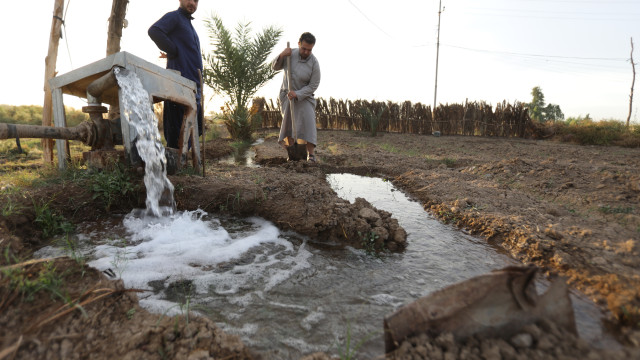According to a new study that analyzed millions of groundwater level measurements from 170,000 wells in more than 40 countries, many parts of the world are rapidly running out of groundwater supplies that billions of people rely on for drinking, irrigation and other needs, CNN reported.
According to the researchers involved, this is the first study to provide an overview of what is happening to groundwater levels globally, and will help scientists better understand the impact humans are having on this valuable underground resource - either through overuse or indirectly through changes in precipitation linked to climate change.
Groundwater, contained in cracks and pores in permeable rock bodies known as aquifers, is a lifeline for humans, especially in parts of the world where rainfall and surface water are in short supply, such as northwest India and the southwestern United States.
Declining groundwater tables can make it difficult for people to access fresh water for drinking or for irrigating crops and can lead to landslides.
"This study was driven by curiosity. We wanted to better understand the state of groundwater globally by keeping up with millions of measurements of its levels," said study co-author Debra Perron, an associate professor in the University of California, Santa Barbara's Environmental Studies Program.
The authors found that groundwater levels declined between 2000 and 2022 in 71% of the 1,693 aquifer systems included in the study, and in 36%, or 617, of these, groundwater levels declined by more than 0.1 meters per year.
The Ascoy-Soplamo aquifer in Spain had the fastest rate of decline in the data they collected - an average decline of 2.95 meters per year, says study co-author Scott Jasechko, an associate professor in the Bren School of Environmental Science and Management at the University of California, Santa Barbara.
"Several aquifer systems in Iran are among those with the fastest rate of groundwater decline," he adds.
The team was unable to collect data from much of Africa, South America, and Southeast Asia due to a lack of monitoring, but Jasechko says the study includes the countries where most global groundwater pumping is taking place.
The study also points to some success cases in Bangkok, Arizona and New Mexico, where groundwater has begun to recover after interventions to better regulate water use or divert water to replenish depleted aquifers.
"I was impressed by the smart strategies that have been put into action to address groundwater depletion in several locations, although this 'good news' is very rare," the associate professor said.
Donald John McAllister, a hydrologist at the British Geological Survey who was not involved in the study, said it was a "really impressive" dataset, despite some gaps.
"I think it's fair to say that such a global compilation of groundwater data has not been done, certainly on this scale, at least to my knowledge, before. Groundwater is an extremely important resource, but one of the challenges is that because we can't see it, it's out of sight for most people. Our challenge is to constantly convince policymakers that we have this resource that we need to take care of and that we can use to build resilience and adapt to climate change“.
Groundwater levels are declining rapidly worldwide







